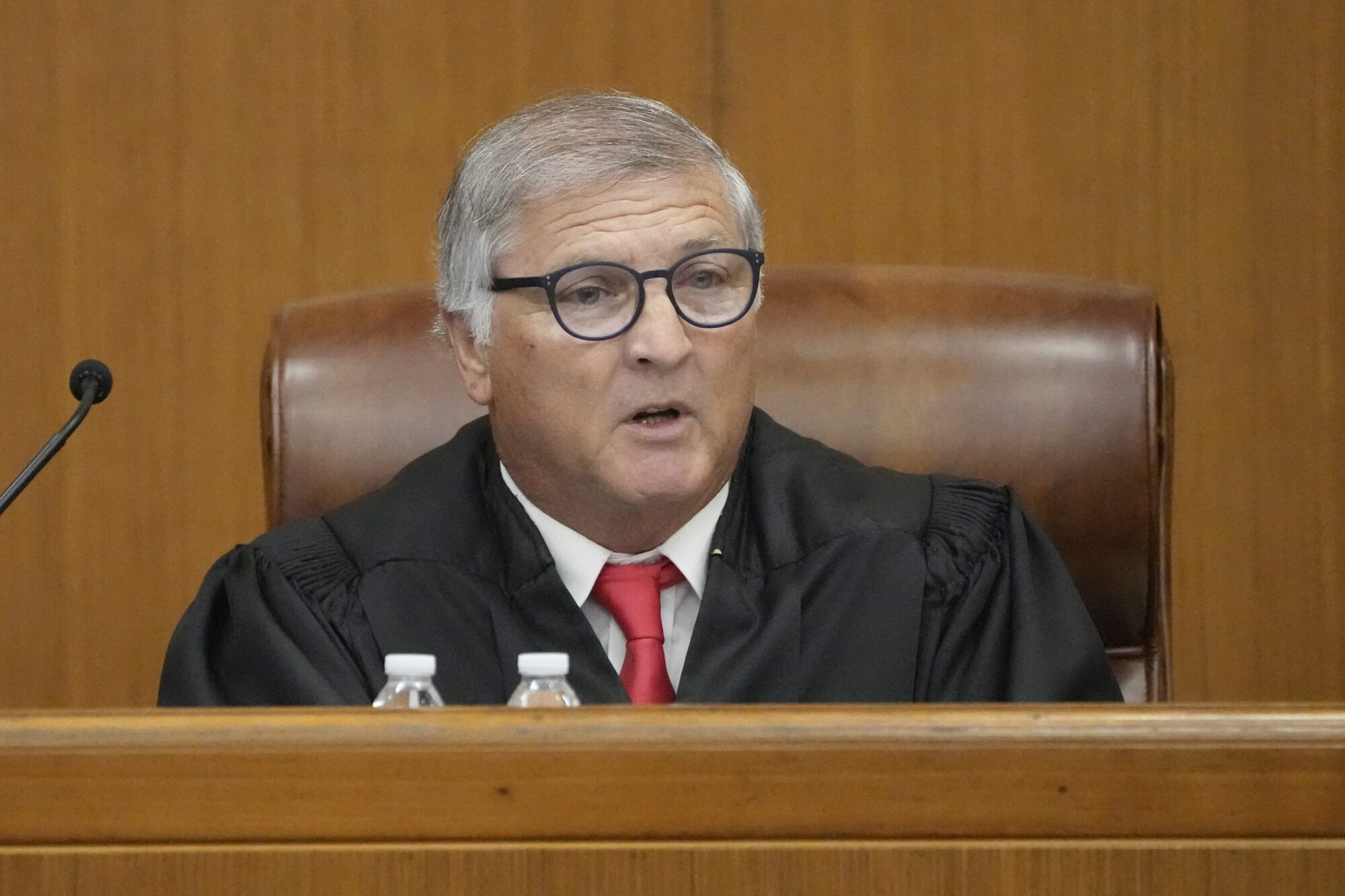
Hinds County Chancery Judge Dewayne Thomas speaks to the parties involved at a hearing, Wednesday, May 10, 2023, in Hinds County Chancery Court in Jackson, Miss., where he heard arguments about a Mississippi law that would create a court system with judges who would be appointed rather than elected. (AP Photo/Rogelio V. Solis)
While a Hinds County judge has decided not to block the controversial bill, a federal order that blocks the law from being implemented remains in effect pending hearing.
On Monday, Judge Dewayne Thomas issued his order regarding a lawsuit filed against HB 1020. The suit, filed on behalf of three Jackson residents, challenged the provisions within the law that allow for temporary appointed judges to help with case backlogs in Hinds County and the creation of a lower municipal court within the Capitol Complex Improvement District (CCID).
Judge Thomas denied the plaintiff’s motion for a preliminary injunction and granted the Attorney General’s motion to dismiss the complaint. The Court’s order says the plaintiffs failed to state a claim upon which relief may be granted.
The decision by the Court is now subject to appeal to Mississippi’s appellate courts. In the immediate term, the law is still on hold due to a temporary restraining order entered by Judge Henry Wingate in a separate case brought in federal court by the NAACP.
Representation for Plaintiffs in the case say they plan to appeal.
The three Jackson, Mississippi residents challenging H.B. 1020 in state court are deeply disappointed by Judge Thomas’s ruling and are prepared to take their fight to the Mississippi Supreme Court. They will file their Notice of Appeal tomorrow morning, and on appeal will argue that the plain language of the Mississippi Constitution demands that circuit court judges be elected and does not permit the four judicial appointments to the Hinds County Circuit Court required by H.B. 1020. The plaintiffs also will challenge other rulings made in the chancery court, including Judge Thomas’s determination that Chief Justice Michael Randolph is entitled to judicial immunity and cannot be sued in Mississippi state court.
The federal case questions HB 1020’s compliance with the U.S. Constitution and federal law. A hearing has been set in that case for May 22nd.
Last week, Judge Thomas dismissed Mississippi Supreme Court Chief Justice Michael Randolph and Circuit Clerk Zack Wallace from being named as defendants in the case. He said if allowed to remain in the suit, it would be a violation of their positions and oath of office.
In today’s opinion on HB 1020 as a whole, Judge Thomas ultimately found that the plaintiffs failed to meet the high standard of “beyond a reasonable doubt” in questioning the constitutionality of HB 1020 and demonstrating irreparable harm to them if the law takes effect:
After careful consideration, this Court finds Plaintiffs claims fail on the merits. Plaintiffs are unable to prove, beyond a reasonable doubt, that the challenged provisions are unconstitutional; Plaintiffs are unable to demonstrate irreparable harm; Plaintiffs are unable to show that the harm to Plaintiffs outweighs any harm to Defendants; and Plaintiffs are unable to show that an injunction will serve the public interest. This Court is extremely mindful of the importance of this litigation and the impending deadlines for effectiveness of the legislation at issue. Therefore, this Court has acted expeditiously in its efforts to bring this matter to full conclusion.
Judge Thomas went on to add that the Court found the injunctive relief is not consistent with the public interest. He says in the opinion public interest is served in a greater capacity with safeguards for implementation of duly-enacted legislation and upholding and enforcing laws and regulations.
Cliff Johnson, with the MacAurthur Justice Center, was the primary attorney for the three plaintiffs in the case. Assisting organizations include the ACLU of Mississippi and Mississippi Center for Justice.
About the legislation
The bill expands the CCID and allows for Capitol Police to have increased jurisdiction throughout the entire city of Jackson.
The legislature passed the bill late in the 2023 session amid a large amount of criticism from members of the Jackson and Hinds County delegation. Rep. Trey Lamar, who authored the bill, has maintained the intent is to help clear backlogs in Hinds County and provide additional police presence in Jackson.
“I believe the Opinion is legally sound, and I appreciate the Court’s expeditious and studious attention to this serious matter.,” said Representative Lamar on the opinion.
Governor Tate Reeves signed the legislation shortly after sine die. He called it an attempt to make Jackson better.
“The fact is that Jackson has so much potential. It is our capital city and the heart of our state. It is where I have lived for over one-third of my life. But Jackson has to be better. Downtown Jackson should be so safe that it is a magnet for talented young people to come and live and work and create. This legislation won’t solve the entire problem, but if we can stop one shooting, if we can respond to one more 911 call – then we’re one step closer to a better Jackson. I refuse to accept the status quo,” Reeves said. “As long as I’m Governor, the state will keep fighting for safer streets for every Mississippian no matter their politics, race, creed, or religion – regardless of how we’re portrayed by liberal activists or in the national media.”











